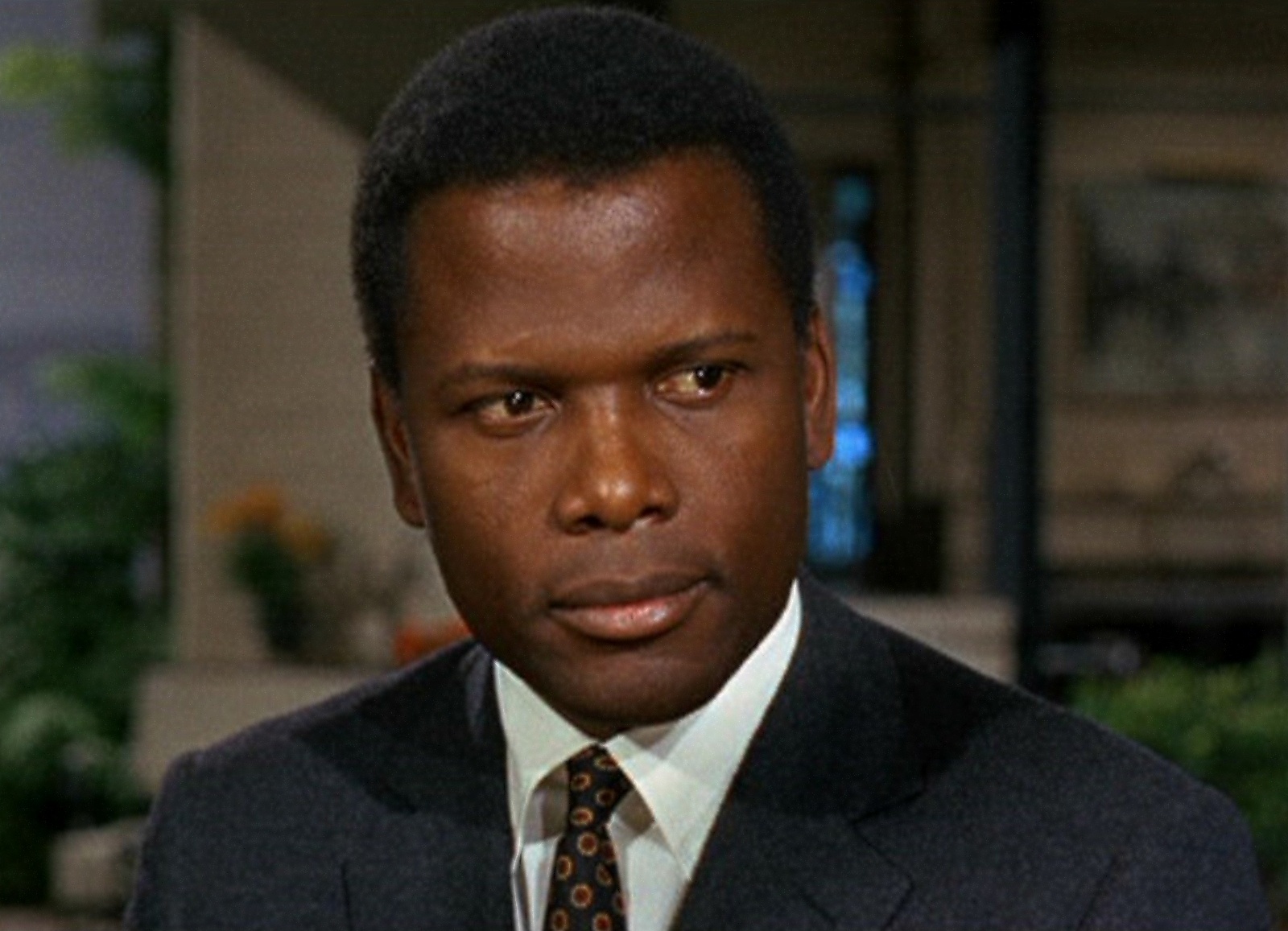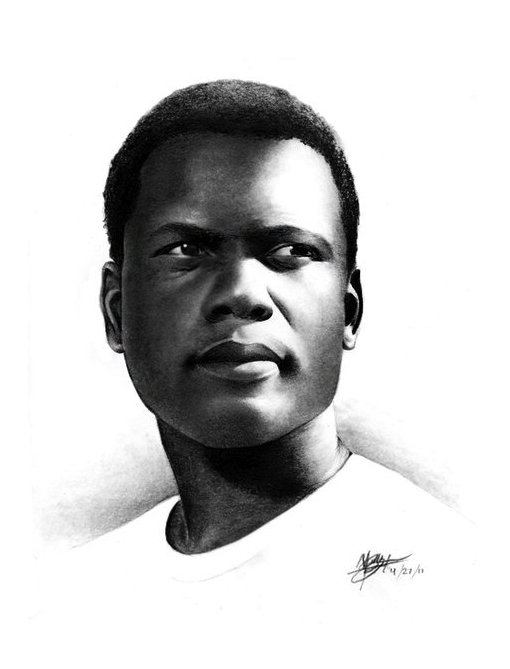
A native of Cat Island, The Bahamas, (though born in Miami during a mainland visit by his parents), Poitier grew up in poverty as the son of a dirt farmer. He had little formal education and at the age of 15 was sent to Miami to live with his brother, in order to forestall a growing tendency toward delinquency. In the U.S., Poitier first experienced the racial chasm that divides the country, a great shock to a boy coming from a society with a black majority. A determination to find and create opportunities for blacks was born in him because of the poor treatment he received on the streets of Miami. At 18, he went to New York, did menial jobs and slept in a bus terminal toilet. A brief stint in the Army as a worker at a veteran's hospital was followed by more menial jobs in Harlem. An impulsive audition at the American Negro Theatre was rejected so forcefully that Poitier dedicated the next six months to overcoming his accent and performance ineptness. On his second try, he was accepted. He was spotted in a rehearsal and given a bit part in a Broadway production of "Lysistrata," for which he got excellent reviews. By the end of 1949, he was having to choose between leading roles on stage and an offer to work for Darryl F. Zanuck in the film No Way Out (1950). Poitier's performance as a doctor treating a white bigot got him plenty of notice and led to more roles, each considerably more interesting and prominent than most black actors of the time were getting. Nevertheless, the roles were still less interesting and prominent than those white actors routinely obtained. But seven years later, after turning down several projects he considered demeaning, Poitier got a number of roles that catapulted him into a category rarely if ever achieved by a black man of that time, that of starring leading man.

One of the films, The Defiant Ones (1958), gave Poitier his first Academy Award nomination as Best Actor. Five years later, he won the Oscar for Lilies of the Field (1963), the first black to win for a leading role. Poitier maintained activity on stage, on screen, and in the burgeoning Civil Rights movement. His roles in Guess Who's Coming to Dinner (1967) and To Sir, with Love (1967) were for their time landmarks in the breaking down of social barriers between blacks and whites, and Poitier's talent, conscience, integrity, and inherent likability placed him on equal footing with the white stars of the day. He took on directing and producing chores in the Seventies, achieving success in both arenas. Although he has reduced the frequency of his roles in recent years, he remains one of the most respected and beloved figures in American cinema of the twentieth century.

In 1963 he became the first black man to win an Academy Award, for his role as Homer Smith in Lilies of the Field (1963).
When he came to New York from the Caribbean to become an actor, he was so impoverished at first that he slept in the bus station. To get his first major role in No Way Out (1950), he lied to director Joseph L. Mankiewicz and told him he was 27, when actually only 22 years old.
Sits on USC School of Cinema-Television's Board of Councilors.
Stanley Kramer approached him about co-starring in The Defiant Ones (1958), which made him a bigger star, but admitted that if he did not take the role of "Porgy" in Porgy and Bess (1959) for Samuel Goldwyn it might kill his chances to get the role in The Defiant Ones (1958) as Goldwyn had that much clout in Hollywood.
Appointed an Knight Commander of the Order of the British Empire in 1974. Although this is often mistaken to have been an honorary knighthood, it is actually a substantive knighthood, as Poitier is a citizen of The Bahamas, a Commonwealth realm which at the time of his appointment recognized the British Honours System. He is thus entitled to be known as Sir Sidney Poitier, but does not himself use this title.
His Stir Crazy (1980) was the highest grossing film directed by a black filmmaker until Scary Movie (2000), directed by Keenen Ivory Wayans almost 20 years later.
Of Haitian ancestry from his father's side.
While trying to sing with some fellow actors in Off-Broadway theatre he found he was tone deaf.
Younger brother of Cyril Poitier.
In the 1960s, for many of his films, he was paid in a way known as "dollar one participation" which basically means he begins collecting a cut of the film's gross from the first ticket sold.
Has an honorary doctorate degree from Shippensburg University of Pennsylvania.
Fluent in Russian.
First black actor to place autograph, hand, and footprints in the cement at Grauman's Chinese Theatre (June 23, 1967).
Premiere Magazine ranked him as #20 on a list of the Greatest Movie Stars of All Time in their Stars in Our Constellation feature (2005).
Was named #22 greatest actor on the 50 Greatest Screen Legends by the American Film Institute
Was nominated for Broadway's 1960 Tony Award as Best Actor (Dramatic) for "A Raisin in the Sun," a role that he recreated in the film version of the same same, A Raisin in the Sun (1961).
Future wife Joanna Shimkus encouraged him to direct his first film, Buck and the Preacher (1972), after he and the original director could not agree creatively.
His performance as Virgil Tibbs in In the Heat of the Night (1967) is ranked #55 on Premiere Magazine's 100 Greatest Performances of All Time (2006).
His performance as Virgil Tibbs in In the Heat of the Night (1967) is ranked #20 on Premiere Magazine's 100 Greatest Movie Characters of All Time.
During the early 1980s a man named David Hampton conned his way into the homes of several wealthy and prominent New Yorkers (including a dean at Columbia University) by falsely claiming to be Poitier's son. Playwright John Guare, fascinated by the way the story illustrated the magic that the mere mention of Poiter's name held for people of his generation (especially white people), based his play "Six Degrees of Separation" on Hampton's story. The play was adapted into the movie Six Degrees of Separation (1993) in 1993, with Will Smith as the character based upon Hampton.
Along with Gary Cooper, is the most represented actor on the American Film Institute's 100 Most Inspiring Movies of All Time, with five of his films on the list. They are: A Raisin in the Sun (1961) at #65, The Defiant Ones (1958) at #55, Lilies of the Field (1963) at #46, Guess Who's Coming to Dinner (1967) at #35, and In the Heat of the Night (1967) at #21.
His performance as Detective Virgil Tibbs in In the Heat of the Night (1967) is ranked #19 on the American Film Institute's 100 Heroes & Villains.
Along with his name uttered in the lyrics, a photograph of Poitier is held by Busta Rhymes in the 1998 rap video "Gimme Some More".
Received the Screen Actors Guild's Life Achievement Award.
His role in The Bedford Incident (1965) marked the first time he would play a role in which his character's race was not an issue.
Considered for the male lead for The Owl and the Pussycat (1970), opposite Diana Sands, who had played the part of "Doris" on Broadway.
Prostate cancer survivor.
Has four grandchildren and two great-granddaughters [2008].
Is a long time friend of singer, fellow actor and activist Harry Belafonte. They were born 9 days apart. They met in New York at age 20 before either was in show business.
No comments:
Post a Comment